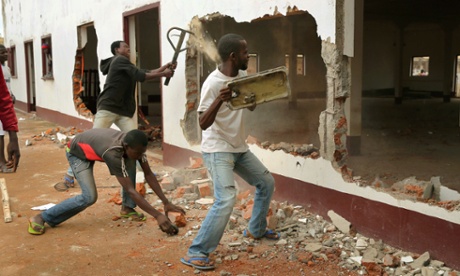'A patient was killed and hospital staff were beaten trying to protect him'
Delphine Chedorge, MSF’s head of mission, talks about the challenges of delivering medical aid in Central African Republic
Since the ousting of President Bozize in March 2013, Central African Republic has been more unstable than ever. A Séléka Muslim rebel coalition seized power, leading to killings and lootings met by revenge attacks from the anti-balaka (anti-machete) Christian militia. The country is experiencing widespread sectarian violence and the UN warned that “seeds of genocide” were being sown against Muslims. An African-led and French-backed peacekeeping force known as MISCA was taken over by the UN in September.
What is it like working in a country experiencing conflict?
There is no work, there is no money. It’s the poorest country in the world and the violence is something you experience every day. This year there has not been a single day without a national colleague saying things like: “My house has been robbed again. My brother has been killed. My sister was sick and died because she couldn’t go to hospital.” They are afraid every night and every day. I saw my Muslim colleagues, who I’ve known since 2007, leaving the country in January. It’s very difficult for everybody here.
Does this affect your work?
We do what we can with our national colleagues but I can see in their eyes that they are tired. They try to understand why their country is not functioning, why they cannot live in peace, and what the international community is doing. They ask me: “What can we do?” This is the reality we face when there are barricades and they cannot come to work. But they try their best; they stay and sleep in the hospital or they sleep at home with us.
Psychologically it’s probably something we should investigate more, especially for the medical staff; how they cope with violence when they take care of other people. They are victims as well. It’s becoming so common.
Have any of your colleagues been attacked at work?
It has happened several times, especially in December and January, that armed men have tried to come into the hospital. In Carnot, one of our patients was killed in front of us in the hospital and the medical staff were beaten trying to protect him.
Why was the patient killed?
Because he was Muslim. The same day, we had another Muslim guy in our hospital who had a small wound after being lynched. We were taking this man back to the church where Muslims are living as refugees, but the anti-balaka had been fighting MISCA peacekeepers nearby and when one anti-balaka was killed, people chose to get revenge on the patient – they jumped on the car and pulled him out. The medical staff and the driver tried to protect him, but they were pushed back. The guys killed the patient because he was a Muslim passing by. He was just the enemy of the day. The country is not functioning so people become crazy and they try to find one enemy. That day it was this one.
Has your car ever been attacked?
No, but I remember in January we were trying to rescue some wounded from the Muslim enclave in Bangi – there were anti-balaka throwing grenades. People were calling us saying: “We have two children wounded, please come to take them.” When we arrived at the enclave there was a barricade set up by anti-balaka. When they see your car passing it’s very tense. They said: “You white people, you are bringing problems here. You are helping Muslims so you are enemies.” At this moment you think: “Okay, we should just do a u-turn now and say that we cannot take the children.”
Do you ever want to give up and go home?
Yes. At some point we just get tired. To continue the job and be helpful for your colleagues and your patients, you need to be full of energy and have a clear mind. To be far from home for a long time, to be exposed to the violence for a long time, at some point you need a break.
What is it like being back home?
We feel empty. It’s very difficult to share the experience, to share what you have done with family, because you want to protect them and not to tell them everything. You realise that each time you start to tell the story to your family or friends they listen for five minutes then they speak about something else. You feel alone sometimes.
Do you ever see real change from the work you have done?
We know from the beginning that we are not changing the world. The benefit has to be to the patient. If we help the person, voila. That’s what we want. Of course we can say: “We treated 5000 people; these were the wounded we took care of,” but we are just coping with this war, and helping as many individuals as we can.
When do you think you will stop being an aid worker?
In December I told my boss: “I want to go to Central African Republic because I love this country, I know this country and I am so sad for this country. But I think this will be my last mission.” I am tired and I need a break, but I’m very unsure about what I will be able to do in France now. I will study first and then I will see what I need or want to do. My nephews are now eight and 10 years old. I like to see them growing up. That’s becoming more important now.
Read more stories like this:



